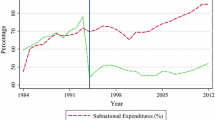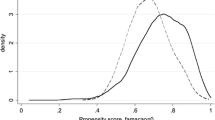Abstract
Analyses of data from 600 households in the province of Lubin, Poland, five years after the economic transformation indicated the transfers of goods and services between households to be quite prevalent, with households with high levels of resources giving goods and services and those with low levels of resources receiving goods and services. The receipt of such transfers does not improve the living conditions of the receiving households relative to those who do not receive help; in fact, those receiving help report lower levels of satisfaction than those not receiving assistance.
Similar content being viewed by others
References
Ackerman, N., & Paolucci, B. (1983). Objective and subjective income adequacy: Their relationship to perceived life quality measures. Social Indicators Research, 12, 25-48.
Anderson, M., Bechhofer, F., & Gershuny, J. (1994). Introduction. In M. Anderson, F. Bechhofer, & J. Gershuny (Eds.), The social and political economy of the household (pp. 1-16). New York: Oxford University Press.
Andrews, F. M., & Withey, S. B. (1976). Social indicators of well-being. New York: Plenum.
Arizpe, L. (1982). Relay migration and the survival of peasant households. In H. I. Safa (Ed.), Towards a political economy of urbanization in third world countries (pp. 19-46). Delhi, India: Oxford University Press.
Atkinson, T., Liem, R., & Liem, J. H. (1986). The cost of unemployment: Implications for social support. Journal of Health and Social Behavior, 27, 317-331.
Babbie, E. (1995). The practice of social research (7th ed.). Belmont, CA: Wadsworth Publishing Company.
Baum, A., Fleming, R., & Reddy, D. M. (1986). Unemployment stress: Loss of control, reluctance, and learned helplessness. Social Science and Medicine, 22, 509-517.
Belyea, M. J., & Lobao, L. M. (1990). Psychosocial consequences of agricultural transformation: The farm crisis and depression. Rural Sociology, 55, 58-75.
Bivens, G. E. (1976). The grants economy and study of the American family: A possible framework for trans-disciplinary approaches. Home Economics Research, 5, 70-78.
Boulding, K. E. (1970). Beyond Economics. Ann Arbor, MI: University of Michigan Press.
Broman, C. L., Hoffman, W. S., & Hamilton, V. L. (1994). Impact of mental health services use on subsequent mental health of autoworkers. Journal of Health and Social Behavior, 35, 80-85.
Broman, C. L., Hamilton, V. L., Hoffman, W. S., & Mavaddat, R. (1995). Race, gender, and the response to stress: Autoworkers' vulnerability to long-term unemployment. American Journal of Community Psychology, 23, 813-843.
Campbell, A., Converse, P. E., & Rodgers, W. L. (1976). The quality of American life. New York: Russell Sage.
Campbell, R. R., Spencer, J. C., & Amonker, R. G. (1993). The reported and unreported Missouri Ozarks: Adaptive strategies of the people left behind. In T. A. Lyson, & W. W. Falk (Eds.), Forgotten places: Uneven development in rural America (pp. 30-52). Lawrence, KS: University Press of Kansas.
Cantril, H. (1965). The pattern of human concerns. New Brunswick, NJ: Rutgers University Press.
Caplan, R. D., Vinokur, A. D., Price, R. H., & van Ryn, M. (1989). Job seeking, reemployment, and mental health: A randomized field experiment in coping with job loss. Journal of Applied Psychology, 74, 759-769.
Chamberlain, K., & Zika, S. (1992). Stability and change in subjective well-being over short time periods. Social Indicators Research, 26, 101-117.
Conger, R. D., & Elder, G. H., Jr. (Eds.) (1994), Families in troubled times. New York: Aldine de Gruyter.
Cornelius, W. A. (1975). Politics and the migrant poor in Mexico City. Stanford, CA: Stanford University Press.
Danes, S. M., Winter, M., & Keefe, D. R. (1987). Nonmarket interfamily transfers and the quality of life: A study of Mexican Americans. Family Perspective, 21(2), 119-132.
Danes, S. M., Winter, M., & Whiteford, M. B. (1987). Level of living and participation in the informal market sector among rural Honduran women. Journal of Marriage and the Family, 49, 631-639.
Deacon, R. E., & Firebaugh, F. M. (1975). Home management: Context and concepts. Boston, MA: Houghton Mifflin.
Deacon, R. E., & Firebaugh, F. M. (1981). Family resource management: Principles and applications. Boston, MA: Allyn and Bacon.
Deacon, R. E., & Firebaugh, F. M. (1988). Family resource management: Principles and applications (2nd ed.). Boston, MA: Allyn and Bacon.
DeMaris, A. (1995). A tutorial in logistic regression. Journal of Marriage and the Family, 57, 956-98.
Diener, E. (1984). Subjective well-being. Psychological Bulletin, 95, 542-575.
Diener, E. (1994). Assessing subjective well-being: Progress and opportunities. Social Indicators Research, 31, 103-157.
Diener, E., & Larsen, R. J. (1984). Temporal stability and cross-situational consistency of affective, behavioral, and cognitive responses. Journal of Personality and Social Psychology, 47, 871-883.
Dooley, D., & Catalano, R. (1984). Why the economy predicts help-seeking: A test of competing explanations. Journal of Health and Social Behavior, 25, 160-176.
Dooley, D., Catalano, R., & Rook, K. S. (1988). Personal and aggregate unemployment and psychological symptoms. Journal of Social Issues, 44, 107-123.
Duncan, O. D. (1975). “Does money buy satisfaction?” Social Indicators Research, 2, 267-274.
Easterlin, R. A. (1973). “Does money buy happiness?” The Public Interest, 30, 3-10.
Eckstein, S. (1977). The poverty of revolution. Princeton, NJ: Princeton University Press.
Edin, K., & Lein, L. (1997). Making ends meet: How single mothers survive welfare and low-wage work. New York: Russell Sage Foundation.
Ensminger, M. E., & Celentano, D. D. (1988). Unemployment and psychiatric distress: Social resources and coping. Social Science and Medicine, 27, 239-247.
Ensminger, M. E., & Celentano, D. D. (1990). Gender differences in the effect of unemployment on psychological distress. Social Science and Medicine, 30, 469-477.
Ernst, M. (1997). Dimensions of the Polish economic transition: The ingredients of success. Post-Soviet Geography and Economics, 38, 1-46.
Fletcher, C. N., Winter, M., & Gaddis, B. J. (1998). (Volume 44). Studying welfare reform: Challenges and opportunities. In I. E. Leech (Ed.), Consumer Interests Annual, Volume 44, 72-77.
Foster, G. M. (1967). Tzintzuntzan: Mexican peasants in a changing world. Boston: Little Brown.
Gore, S. (1978). The effect of social support in moderating the health consequences of unemployment. Journal of Health and Social Behavior, 19, 157-165.
Halperin, R. (1990). The livelihood of kin: Making ends meet “the Kentucky way.” Austin, TX: University of Texas Press.
Hamilton, V. L., Broman, C. L., Hoffman, W. S., & Renner, D. S. (1990). Hard times and vulnerable people: Initial effects of plant closing on autoworkers' mental health. Journal of Health and Social Behavior, 31, 123-140.
Headey, B. (1993). An economic model of subjective well-being: Integrating economics and psychological theories. Social Indicators, 28, 97-116.
Headey, B., & Wearing, A. (1989). Personality, life events, and subjective well-being: Toward a dynamic equilibrium model. Journal of Personality and Social Psychology, 57, 731-739.
Isaksson, K. (1989). Unemployment, mental health and the psychological functions of work in male welfare clients in Stockholm. Scandinavian Journal of Social Medicine, 17, 165-169.
Iversen, L., & Sabroe, S. (1988). Psychological well-being among unemployed and employed people after a company closedown: A longitudinal study. Journal of Social Issues, 44, 141-152.
Jensen, L., Cornwell, G. T., & Findeis, J. L. (1995). Informal work in nonmetropolitan Pennsylvania. Rural Sociology, 60, 91-107.
Kan, K. (1996). Empirical evidence on consumption smoothing and intergenerational transfers. Southern Economic Journal, 63(1), 76-94.
Keefe, S. E. (1979). Urbanization, acculturation, and extended family ties: Mexican Americans in cities. American Ethnologist, 6, 349-365.
Keefe, S. E., Padilla, A., & Carlos, M. L. (1979). The Mexican American extended family as an emotional support system. Human Organization, 38, 144-152.
Keefe, T. (1984). The stresses of unemployment. Social Work, 29, 264-268.
Kemper, R. V. (1977). Migration and adaptation: Tzintzuntzan peasants in Mexico City. Beverly Hills: Sage.
Kemper, R. V. (1981). Obstacles and opportunities: Household economics of Tzintzuntzan migrants in Mexico City. Urban Anthropology, 10, 212-229.
Kessler, R. C., Turner, J. B., & House, J. S. (1989). Unemployment, reemployment, and emotional functioning in community sample. American Sociological Review, 54, 648-657.
Kong, F., Perrucci, C. C., & Perrucci, R. (1993). The impact of unemployment and economic stress on social support. Community Mental Health Journal, 29, 205-221.
Kramer, M. (1995). Polish workers and the post-Communist transition: 1989–1993. Communist and Post-Communist Studies, 28(1), 71-114.
Lane, T. D. (1992). Transforming Poland's economy. Finance and Development, 29(2), 10-13.
Lee, Y. J., & Aytac, I. A. (1998). Intergenerational financial support among Whites, African Americans, and Latinos. Journal of Marriage and the Family, 60, 426-441.
Leven, B. (1991). The welfare effects on women of Poland's economic reforms. Journal of Economic Issues, 25(2), 581-588.
Liem, G. R., & Liem, J. H. (1988). Psychological effects of unemployment on workers and their families. Journal of Social Issues, 44, 87-105.
Lipton, D., & Sachs, J. (1990). Creating a market economy in eastern Europe: The case of Poland. Brookings Papers on Economic Activity, 1, 75-147.
Litt, J., Gaddis, B. J., Fletcher, C. N., & Winter, M. (in press). Leaving welfare: Independence or continued vulnerability? Journal of Consumer Affairs.
Lloyd, P. (1980). The “young towns” of Lima. New York: Cambridge University Press.
Logan, K. (1981). Getting by with less: Economic strategies of lower income households in Guadalajara. Urban Anthropology, 10, 231-246.
Lomnitz, L. A. (1977). Networks and marginality: Life in a Mexican shantytown. New York: Academic Press.
Lorenz, F. O., Conger, R. D., & Montague, R. (1994). Doing worse and feeling worse: Psychological consequences of economic hardship. In R. D. Conger & G. H. Elder, Jr. (Eds.), Families in troubled times (pp. 167-186). New York: Aldine de Gruyter.
Malinowska, E. (1995). Socio-political changes in Poland and the problem of sex discrimination. Women's Studies International Forum, 18, 35-43.
Marotz-Baden, R., & Colvin, P. L. (1989). Adaptability, cohesion, and coping strategies of unemployed blue-collar families with adolescents. Lifestyles: Family and Economic Issues, 10, 44-60.
Martinson, O. B., Wilkening, E. A., & Linn, J. G. (1985). Life change, health status, and life satisfaction: A reconsideration. Social Indicators Research, 16, 301-313.
Martinson, O. B., Wilkening, E. A., & McGranahan, D. (1984). Predicting overall life satisfaction: The role of life cycle and social psychological antecedents. Social Indicators Research, 14, 99-108.
Morris, E. W. (1991). Household, kin and nonkin sources of assistance in home building: The case of the city of Oaxaca. Urban Anthropology, 20, 49-66.
Morris, E. W. (1998). Household responses to major economic change in Poland: A theoretical framework. Journal of Family and Economic Issues, 19, 199-220.
Morris, E. W., & Winter, M. (1995). Two-way transfers in intergenerational coresidence: A final report to the AARP-Andrus Foundation. Saint Paul: University of Minnesota, College of Human Ecology, Department of Design, Housing, and Apparel.
Morris, E. W., Woods, M. E., & Jacobson, A. L. (1972). Measuring the quality of housing. Land Economics, 48, 383-397.
Norris, W. P. (1988). Household survival in the face of poverty in Salvador, Brazil: Towards an integrated model of household activities. Urban Anthropology, 17, 299-321.
Omodei, M. M., & Wearing, A. J. (1990). Need satisfaction and involvement in personal projects: Toward an integrative model of subjective well-being. Journal of Personality and Social Psychology, 59, 762-769.
Pacione, M. (1997). Local exchange trading systems as a response to the globalisation of capitalism. Urban Studies, 34, 1179-1199.
Palaszewska-Reindl, T. (1998). Polish households during the economic transformation. Journal of Family and Economic Issues, 19, 221-234.
Pavot, W., Diener, E., Colvin, C. R., & Sandvik, E. (1991). Response artifacts in the measurement of subjective well-being. Social Indicators Research, 24, 35-56.
Pearlin, L. I., Lieberman, M. A., Menaghan, E. G., & Mullan, J. T. (1981). The stress process. Journal of Health and Social Behaviors, 22, 337-356.
Roberts, B. (1973). Organizing strangers. Austin, TX: University of Texas Press.
Roberts, B. (1994). Informal economy and family strategies. International Journal of Urban and Regional Research, 18, 6-23.
Root, K. (1984). The human response to plant closures. Annals of The American Academy of Political and Social Science, 475, 52-65.
Rosenberg, M. (1968). The logic of survey analysis. New York: Basic Books.
Royce, A. (1981). Isthmus Zapotec households: Economic responses to scarcity and abundance. Urban Anthropology, 10, 269-286.
Selby, H. A., Murphy, A. D., & Lorentzen, S. A. (1990). The Mexican urban household: Organizing for self-defense. Austin, TX: University of Texas Press.
Slay, B. (1994). The Polish economy: Crisis, reform, and transformation. New Jersey: Princeton University Press.
Shinn, M. C. (1992, October). The effects of age on economic well-being and use of financial coping strategies by Idaho households. Paper presented at the annual meeting of the Association for Financial Planning and Counseling Education, Charleston, SC.
Stoller, E. P. (1985). Exchange patterns in the informal support networks of the elderly: The impact of reciprocity on morale. Journal of Marriage and the Family, 47, 335-342.
Stone, A. A., & Neale, J. M. (1984). New measure of daily coping: Development and preliminary results. Journal of Personality and Social Psychology, 46, 892-906.
Strumpl, B. (Ed.). (1976). Economic means for human needs: Social indicators of well-being and discontent. Ann Arbor, MI: Institute for Social Research, University of Michigan.
Turner, J. B., Kessler, R. C., & House, J. S. (1991). Factors facilitating adjustment to unemployment: Implications for intervention. American Journal of Community Psychology, 19, 521-542.
Van Hook, M. (1990). Family responses to the farm crisis: A study in coping. Social Work, 35, 425-431.
Vélez-lbañez, C. G. (1983a). Bonds of mutual trust. New Brunswick, NJ: Rutgers University Press.
Vélez-lbañez, C. G. (1983b). Rituals of marginality. Berkeley: University of California Press.
Vélez-lbañez, C. G. (1988). Networks of exchange among Mexicans in the U.S. and Mexico: Local level mediating responses to national and international transformations. Urban Anthropology, 17, 27-51.
Voydanoff, P., & Donnelly, B. W. (1988). Economic distress, family coping, and quality of family life. In P. Voydanoff & L. C. Majka (Eds.), Families and economic distress (pp. 97-116). Newbury Park, CA: Sage.
Whiteford, M. B. (1976). The forgotten ones: Colombian countrymen in an urban society. Gainesville: University of Florida Press.
Whiteford, M. B. (1982). The interface of cultural factors with nutritional well-being: The case of Moroceli, Honduras. Medical Anthropology, 6(4), 221-230.
Wilhelm, M. S., & Ridley, C. A. (1988). Stress and unemployment in rural nonfarm couples: A study of hardships and coping resources. Family Relations, 37, 50-54.
Williams, C. C. (1996). Informal sector responses to unemployment: An evaluation of the potential of Local Exchange Trading Systems (LETS). Work, Employment & Society, 10, 341-359.
Winter, M. (1991). Interhousehold exchange of goods and services in the city of Oaxaca. Urban Anthropology, 20(1), 67-85.
Winter, M., Bivens, G. E., & Morris, E. W. (1984). The assessment of subjective change in family financial well-being. In G. Rowe, J. DeFrain, H. Lingren, R. MacDonald, N. Stinnett, S. Van Zandt, & R. Williams (Eds.), Family strengths 5: Continuity & diversity (pp. 399-418). Newton, MA: Education Development Center.
Winter, M., & Morris, E. W. (1998). Family resource management and family business: Coming together in theory and research. In R. K. Z. Heck (Ed.), The entrepreneurial family (pp. 30-47). Needham, MA: Family Business Resources, Inc.
Winter, M., Morris, E. W., Gutkowska, K., Jezewska, M., Palaszewska-Reindl, T., Grzeszczak-Swietlikowska, U., & Zelazna, K. (1995). Determinants and consequences of reported well-being in the province of Lublin, Poland. Family Economics and Resource Management Biennial, 1, 85-92.
Winter, M., Morris, E. W., Gutkowska, K., & Jezewska-Zychowicz, M. (1998). Polish workers during economic transformation: Stability and change, 1984–94. International Labour Review, 137(1), 61-80.
Winter, M., Morris, E. W., Gutkowska, K., Jezewska-Zychowicz, M., Paleszewska-Reindl, T., Zelazna, K., & Grzeszczak-Świetlikowska, U. (1999). Constraints, domain conditions, and well-being: Evidence from Poland during the transformation. Journal of Consumer Affairs, 33, 27-47.
Winter, M., Morris, E. W., & Rubio, M. de L. (1988). The subjective assessment of financial well-being among farmers. In V. L. Hampton (Ed.), Proceedings of the 34th annual conference of the American Council on Consumer Interests (pp. 293-299). Columbia, MO: American Council on Consumer Interests.
Author information
Authors and Affiliations
Rights and permissions
About this article
Cite this article
Lune, L.S.V., Winter, M., Morris, E.W. et al. Interhousehold Transfers of Goods and Services and Reported Well-Being Among Polish Households. Journal of Family and Economic Issues 20, 333–366 (1999). https://doi.org/10.1023/A:1022928104989
Issue Date:
DOI: https://doi.org/10.1023/A:1022928104989




